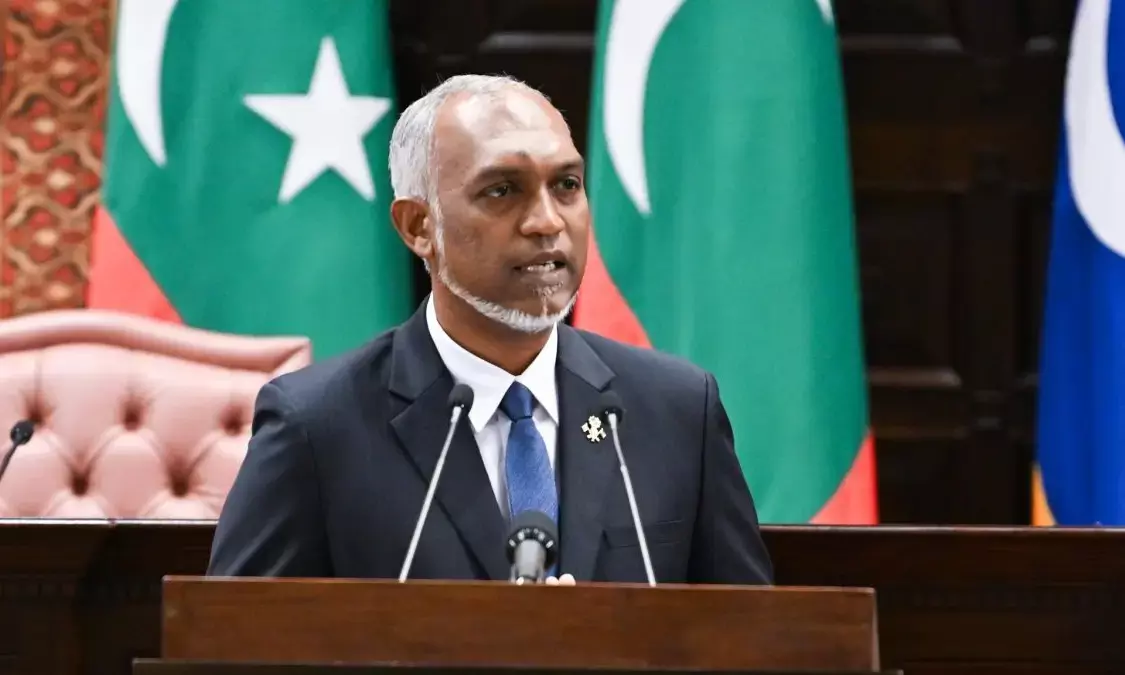Maldivian Prez Muizzu Tells Parliament: ‘We Will Resist Foreign Intruders’
Response to reports that Indian Coastal Guards entered Maldivian waters

The Maldivian President Dr Mohamed Muizzu delivering his maiden address to the People’s Majlis (Parliament) on Monday, declared that his government will beef up the country’s defences on land, sea and air.
He added that his government will resist foreign intruders as the Sultans of yore did when attacked by the Malabars and the Arakkal kingdom. Arakkal kingdom was the Muslim kingdom in Kannur district of Kerala.
The President’s statement came in the wake of allegations that the Indian Coast Guard had without authorization entered the Maldivian territorial waters and harassed Maldivian fishing vessels on two occasions – on January 31 and February 3.
Recalling the first such address to a parliament by Sultan Mohamed Shamsuddeen III in 1932, President Muizzu made his top priority clear: to protect the religion of Islam and the sovereignty and independence of the Maldivian nation.
Muizzu drew comparisons to the great military reigns of Sultan Muhammad Thakurufaanu, Sultan Hasan ‘Izz ud-din, Sultan Mohmaed Imaaduddin I, and Sultan Ibrahim Iskandar I. He declared that his presidency would be one that progressively increases the military capacity of the Maldives and augmented its capabilities for a comprehensive national defence strategy encompassing terrestrial, aerial, and maritime domains.
Highlighting the efforts by Sultan Imaaduddin I to fortify the Maldives with 14 gunmetal canons imported from Indonesia to repel attacks by the Malabars and the Arakkal kingdom, he said, “I believe the Maldives needs to bolster modern military capacity to defend its territories on land, sea, and air”.
The reference to historic efforts in evading attacks by two Indian powerhouses, draws parallels to recent events where Indian naval vessels illegally boarded several Maldivian fishing vessels in the Maldives’ northern Exclusive Economic Zone (EEZ) on two separate occasions, the website ‘maldivesrepublic’ stated.
Muizzu said that work in this line has already begun, and that the nation’s defence force is on the verge of achieving round-the-clock surveillance capabilities over the nation’s 900,000-square-kilometre EEZ.
Stating that a large majority of Maldivian citizens support his administration because of the pledge to remove foreign troops from the country, the president reiterated that diplomatic negotiations were underway for the withdrawal of Indian troops.
As agreed by India in the latest negotiations, the military personnel on one of the three aviation platforms would be withdrawn before 10 March 2024, and the military personnel on the remaining two platforms would be pulled out before 10 May 2024.
While the president evaded giving details of these agreements, he said that both countries agreed to replace the Indian military personnel with civil staff in the operation of military aircraft gifted to the Maldives by India.
The decision to replace military with civilian operators marks a nuanced approach to addressing the sensitivities surrounding foreign military presence in the Maldives, given the heightened sensitivity of the Maldives’ relations with its traditionally allied neighbour.
The President also added that the Maldivian government has officially communicated with India that it will not renew the agreement enabling foreign nations to measure and map the Maldivian oceans and coastlines.
This statement comes amid concerns raised by the opposition regarding two Chinese research vessels currently operating around the Maldivian waters, with India also expressing apprehensions over the presence of two Chinese vessels in the region.
The Maldives foreign ministry had announced it had granted permission for the Xiang Yang Hong 03 to dock for personnel rotation and replenishment, clarifying that the ship would not conduct any research in Maldivian waters.



